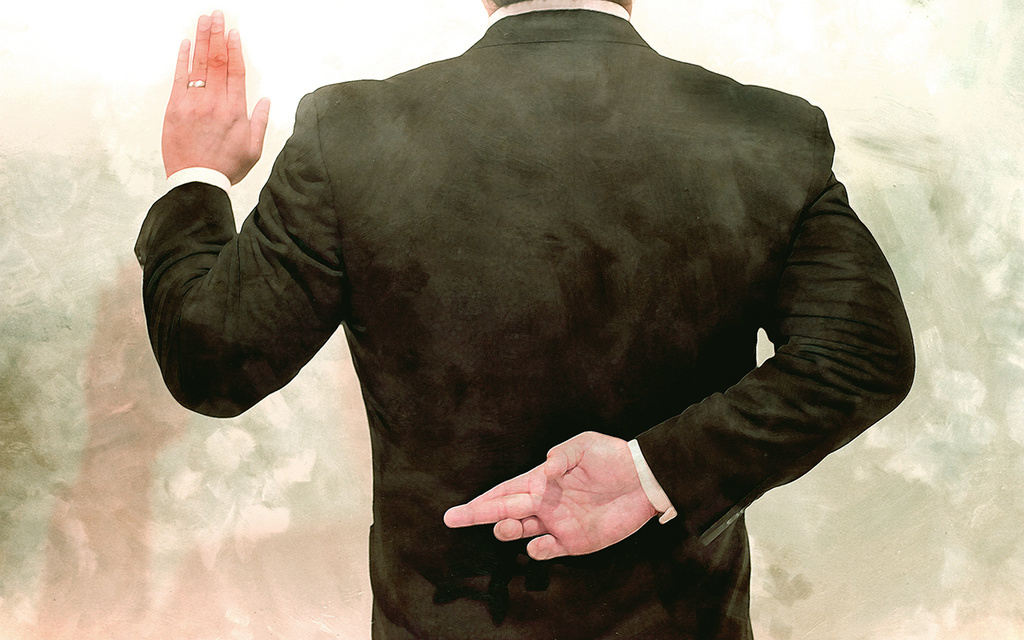
“Empty Suits”
Without faith in God, men become no more than “empty suits.” As moral courage recedes from our world, so too does justice. But without God, justice becomes an empty, changing, and meaningless concept.

- R. J. Rushdoony
[Reprinted from Chalcedon Position Paper No. 189, June 1995]
Claire Sterling, in Octopus (1990), gives an excellent report on the global narcotics trade and the controlling criminal group. She tells of one undercover detective who infiltrated this international group, learning of a federal judge who was bought off by an international figure in the narcotics trade, and was then rewarded with a better position (p. 32). The detective’s work should have led to an explosive exposure and imprisonment of key criminals. Instead, it led to nothing. Much of this was due to the unwillingness of the important and unimportant to act. The detective’s conclusion was that there were too many “empty suits,” too many people in high places and low who wanted no risks, nor hard stands, no uncompromising positions, nothing that might in the slightest endanger their comfortable positions. He recognized that the world was full of “empty suits.”
I was reminded of a pastor who almost twenty years ago concluded that, where a truly Christian stand was necessary, the United States had 30,000 empty pulpits. Again, a professor made an obvious moral stand and was fired illegally and could not afford the legal process of appeal; the rest of the faculty in the main believed he was right, and told him so, but they dared not make a stand.
We live in a world of “empty suits.” This has happened before, with ugly results, and it will be no better this time. Men are everywhere refusing to be men. This may be one reason for the rise in feminism.
On all sides, moral courage is lacking. This should not surprise us. After World War II, statist education was stripped of all traces of Biblical faith. The Ten Commandments were literally abolished from state schools. In one instance, they were actually a part of a building’s wall. (At one time, some American state and court buildings commemorated Moses.)
The result was that children were no longer taught, “Thou shalt not steal,” nor kill, nor bear false witness, nor enter into sexual immorality, because the living God had His unchanging law over us all. Theft is now a game with too many children; they dare one another to prove how much they can steal without being caught. The result is young gangs, a growing lawlessness in every area of life and thought, and silly experts wondering what has gone wrong.
Without faith in God, men become no more than “empty suits.” As moral courage recedes from our world, so too does justice. Justice means the administration of law honestly, to mete out the requirements of God’s law without fear and favor to anything but the truth, and to set forth God’s standard as against man’s sin. But without God, justice becomes an empty, changing, and meaningless concept. Marx held that justice is a class concept, not an unchanging truth. Justice is too often in the courtroom and the jury room a matter of social prejudices and ugly hostilities rather than godly judgment.
The world of “empty suits” is very much with us. It calls for positivism in law, radical deconstruction in literature, hostility to meaning in the arts, and a reduction of life to sex in our interpersonal relationships. The “empty suits” are men without faith, whose lives are without meaning, and whose hope is “self-fulfillment.” Now, self-fulfillment in practice has come to mean, “Let the world go to hell, but I’ll get what I feel should be mine.”
The “empty suits” hate Christianity, because the Bible requires moral responsibility, and it tells us that God will judge us and require an answer of us. The “empty suits” say to their Lord in the time of judgment, “Lord, when saw we thee an hungered, or athirst, or a stranger, or naked, or sick, or in prison, and did not minister unto thee?” (Matt. 25:44). They refuse to recognize the opportunities for responsibility.
Men commonly surrender responsibilities to other agencies, such as church and state. The “empty suits” described by the detective of whom Claire Sterling wrote were men in places of authority. How can we expect men in high and low offices to exercise their moral courage when we ourselves lack it? Do we not too often see our own vacillation reflected in high places? Are not “empty suits” put into power by men very much like themselves?
There are “empty suits” all around us. What are we?

- R. J. Rushdoony
Rev. R.J. Rushdoony (1916–2001), was a leading theologian, church/state expert, and author of numerous works on the application of Biblical law to society. He started the Chalcedon Foundation in 1965. His Institutes of Biblical Law (1973) began the contemporary theonomy movement which posits the validity of Biblical law as God’s standard of obedience for all. He therefore saw God’s law as the basis of the modern Christian response to the cultural decline, one he attributed to the church’s false view of God’s law being opposed to His grace. This broad Christian response he described as “Christian Reconstruction.” He is credited with igniting the modern Christian school and homeschooling movements in the mid to late 20th century. He also traveled extensively lecturing and serving as an expert witness in numerous court cases regarding religious liberty. Many ministry and educational efforts that continue today, took their philosophical and Biblical roots from his lectures and books.